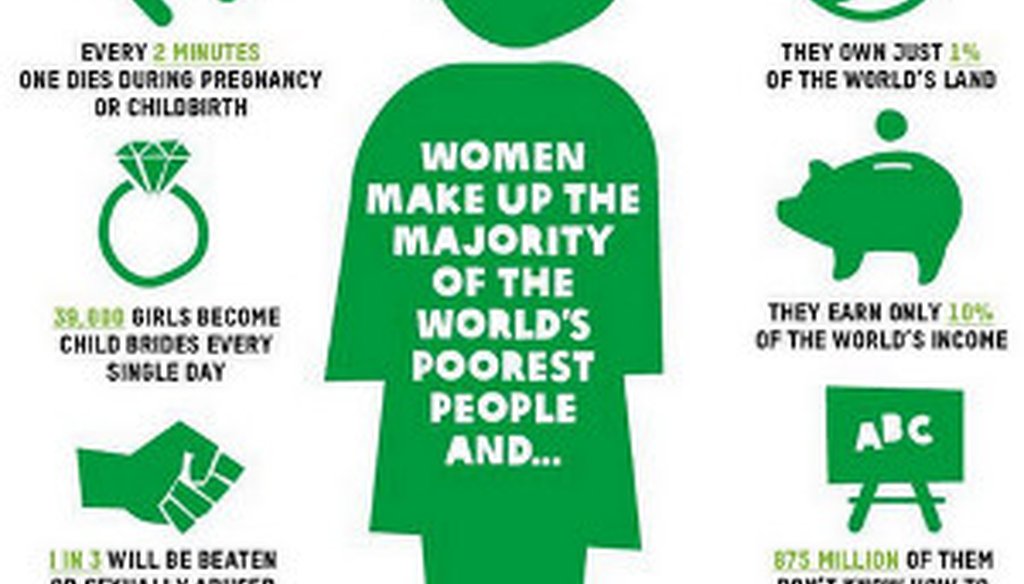Get PolitiFact in your inbox.

Oxfam Ireland tweeted this graphic with the long-standing and incorrect claim that women own less than 1 percent of the world's land.
Do women own 1% of the world's land? No
Women around the world have a hard row to hoe, but do they really own just 1 percent of all the land? That’s the claim in a tweet from Oxfam Ireland. A reader saw Oxfam’s infographic with the stat and asked us to check it. We’ve found similar statements about global poverty to lack a firm grounding in the facts (70 percent of the world’s poor are not women) and that’s the case with this one, too.
Sorcha Nic Mhathuna, a spokeswoman for Oxfam Ireland, the national chapter of the worldwide anti-poverty group, said her organization is "reviewing" this factoid.
"We are aware that this statistic is the subject of substantive debate," Mhathuna said.
Still, Mhathuna could point to some very big organizations that have taken this number as settled fact. In 2012, the World Bank published a report on women, business and the law which said, "UN Women (the United Nations office focused on women’s issues) informs us that "women perform 66 percent of the world’s work, produce 50 percent of the food, but earn 10 percent of the income and own 1 percent of the property."
But the source the World Bank cited is a defunct Web page at the United Nations from a UN division that no longer exists.
Oxfam Ireland also listed a 2013 joint report from UN Women and the UN High Commissioner on Human Rights that said, "it is reported that just 1 percent of the world’s women actually own land."
The source for that? A line from a Web page at the International Center for Research on Women, a group based in Washington. That Web page provided no source and when we contacted the center, they directed us to a 2002 brochure from the UN Food and Agriculture Organization that also offered no supporting data.
What the (limited) numbers say
For all the references back to UN Women, someone forgot to ask the professionals there who know the data. Papa Seck, a statistician in the Research and Data Section at UN Women, said there are no global figures on land ownership.
"I can tell you for sure that this is not a valid statistic," Seck said.
Agnes Quisumbing, a senior fellow with the International Food Policy and Research Institute, a group focused on pragmatic solutions to hunger and poverty, has pushed back against this stat. In 2013, Quisumbing co-authored an article on gender and land ownership in Africa.
Quisumbing and her colleagues noted that measuring land ownership is hardly as simple as it sounds. A woman might have the right to farm a plot of land but not be able to sell it without permission from relatives. Husbands and wives might hold joint title. On top of the need to define what it means to own land, much of the information simply doesn’t exist. Few surveys ask about land ownership at all and those that do often don’t ask about gender. After looking at the best studies they could find, Quisumbing and the others decided that any statement at the global or even regional level would be a "gross oversimplification."
That said, using research from eight African countries, they found that women were generally less likely to be landholders, but the range was large. In Mali, women represented about 3 percent, in Ethiopia, about 18 percent and in Cape Verde, 50 percent.
The authors underscored a common misinterpretation when looking at gender and ownership: The percentage held by women does not mean that men control the rest. In South Africa’s Natal Province for example, 10 percent of women had their name on an ownership document, but the number for men was 29 percent. The bulk of the land might be owned by the community, the government or some other entity.
In March, Cheryl Doss, a development economist at Yale University, used an Oxfam blog to criticize advocates for using the claim that women own a tiny percentage of land.
"Women’s land rights are critically important," Doss wrote. "Yet, using unsubstantiated statistics for advocacy is counterproductive. Advocates lose credibility by making claims that are inaccurate and slow down progress towards achieving their goals because without credible data, they also can’t measure changes."
Doss offered some statistics that advocates could use.
"On average, across 10 countries in Africa, 39 percent of women and 48 percent of men report owning land, including both individual and joint ownership. Only 12 percent of women report owning land individually, while 31 percent of men do so."
Broadly speaking, the pattern holds true in Central and South America. Carmen Diana Deere is a professor in the Latin American Studies department at the University of Florida. Looking at who owns which parcel of land, Deere found that in Mexico, women owned about 20 percent of the parcels, men owned 66 percent and 14 percent were held jointly.
That was the high water mark for female ownership in Deere’s study. At the other end of the spectrum, in Honduras, women owned 12 percent and men owned about 87 percent, with about 1 percent held jointly.
But even in Honduras, the figures refute the Oxfam Ireland claim. Deere said she and others have made this general point since at least 2001.
Quisumbing expressed some frustration about Oxfam Ireland’s use of the errant stat. She had brought this up with the American chapter of Oxfam at a meeting in Boston in mid April.
"I gave a seminar at Oxfam with a lot of people videoconferenced in and yet these myths prevail," Quisumbing said.
The origins of the 1 percent claim
As near as anyone can tell, this factoid emerged in 1978. In a 2013 article debunking this myth in The Atlantic, University of Maryland sociologist Philip Cohen, tracked it back to a paper published by the International Labor Organization titled "Women at Work." Cohen reported that the paper’s author said her numbers were "based on some available global data, and others derived by use of fragmentary indicators at the time." Lacking hard data, she made broad assumptions that women earned so much less than men that "it can be assumed that they normally do not have any surplus to invest."
In other words, the 1 percent statistic about land was a guess. And it stuck.
Our ruling
Oxfam Ireland circulated a graphic with the claim that women own 1 percent of the world’s land. The organization cited well-known bodies such as the World Bank and the United Nations, but none of those sources offered hard evidence. In fact, several pointed back to UN Women, and statisticians there reject this figure.
The data that do exist suggest that women own much less land than men but the situation varies widely from country to country. Plus, the statistic implies that whatever land women don’t own, men do, and that is hugely incorrect.
We rate the claim Pants on Fire.
Our Sources
Oxfam Ireland, Info-graphic tweet, July 22, 2014
World Bank, Women, Business and the Law, 2012
UN Women and UN High Commissioner for Human Rights, Realizing Women’s Rights to Land and Other Productive Resources, 2013
United Nations Development Programme, Gender equality and UNDP, 2011
International Center for Research on Women, Assets and property rights
Food and Agriculture Organization, Women's right to land: A human right, March 8, 2002
International Land Coalition, Women’s Land: Reflections on rural women’s access to land in Latin America, 2013
International Food Policy and Research Institute, Gender inequalities in ownership and control of land in Africa: Myth versus reality, December 2013
Oxfam, Killer factcheck: ‘Women own 2% of land’ = not true. What do we really know about women and land?, March 21, 2014
Bina Agarwal, "A Field of One’s Own: Gender and Land Rights in South Asia", Cambridge University Press, 1994
Carmen Diana Deere and Magdalena Leon, "Empowering Women: Land and Property Rights in Latin America", Pittsburgh University Press, 2001
The Atlantic, 'Women Own 1% of World Property': A Feminist Myth That Won't Die, March 8, 2013
Email interview, Sorcha Nic Mhathuna, communications and content coordinator, Oxfam Ireland, July 26, 2014
Email interview, Erin Kelly, communications, International Center for Research on Women, Aug. 4, 2014
Email interview, Papa Seck, statistician, Research and Data Section, UN Women, Aug. 4, 2014
Interview, Agnes Quisumbing, senior research fellow, International Food Policy and Research Institute, Aug. 4, 2014
Email interview, Cheryl Doss, professor of development economics, Yale University,, Aug. 4, 2014
Email interview, Carmen Diana Deere, professor of Latin American studies and food and resource economics, University of Florida,, Aug. 4, 2014
Browse the Truth-O-Meter
More by Jon Greenberg
Do women own 1% of the world's land? No
Support independent fact-checking.
Become a member!
In a world of wild talk and fake news, help us stand up for the facts.
























































